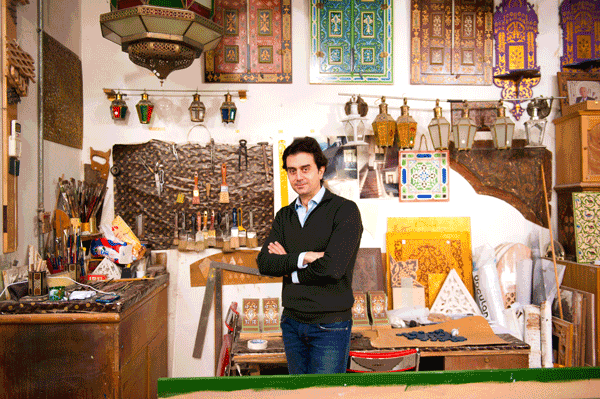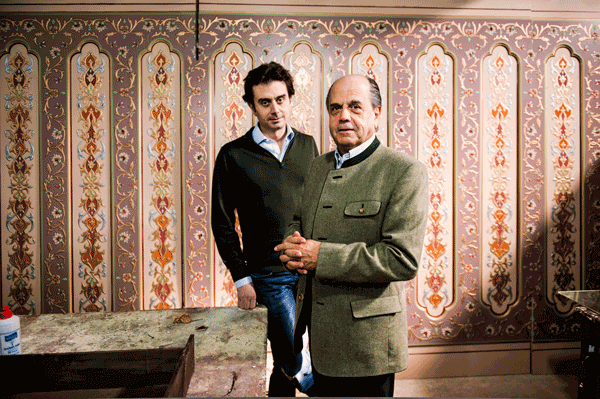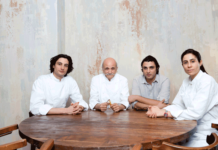In 1862, Dimitri Tarazi began his first commercial venture in Beirut, Lebanon, establishing the foundation for a resilient family business with a complex history. His younger brother André joined the company soon after and together they built their gallery and silk thread embroidery, carpets, old copper, and oriental-style furniture manufacturer.
In 1894, the Tarazi siblings parted ways. Dimitri continued to expand the business with his sons. Seven of his sixteen children followed in his footsteps, securing succession. The family opened a store in Beirut where the oriental furniture and antique trade was flourishing. They founded a branch in Jerusalem around 1895, followed by another in Damascus four years later. At the time the region was filled with commercial promise, attracting many tourists and travellers.
Interview by Tharawat Magazine with Camille Tarazi
[ms-protect-content id=”4069, 4129″]
Dimitri died in 1903, certain that his legacy would live on. The second generation of Tarazis split the various obligations and responsibilities. The siblings were relocated to Cairo, Alexandria, Beirut, Damascus and Jerusalem, establishing five branches of the family business.
Fate, however, eventually took its course. Burdened with heavy financial problems, the family was forced to close their stores in Egypt and Jerusalem. Misfortune struck in 1924 and the branch of Damascus burned down. The Tarazis accepted the challenge and mortgaged everything they had to repay their debts and rebuild their reputation. The courageous family faced many more obstacles and paid dearly to be able to continue pursuing their passion for oriental decor, antiques and furniture.
Branches opened and closed, family members came and went, yet, to this day, the family business still persists even though ownership has thinned down to one active branch, still standing against all odds. Camille – the fifth generation of the Tarazi legacy – explains how his great grandfather bought-out his brothers and centralised ownership to Maison Tarazi in Beirut, now run by Camille and his father Michel.
Tharawat spoke to Camille Tarazi to find out why he joined the family business, how it persisted in spite of a tumultuous history, and why it is important to document the family legacy.
Why did you join the family business?
I studied art and oriental decor, which have always been passions of mine. I believe my love for oriental decor was fostered by my fascination with the history of our family business. We have worked on some major projects. For instance, in 1995 my father was asked to restore the French Embassy in Beirut. My grandfather’s uncle worked on the same project at the beginning of the twentieth century.
The French Embassy is therefore a living example of generations of our family’s work and skill.
By taking on this project, my father inspired me to continue my studies in architecture. I joined the family business in 1998 while still a student. A few years later, I began to undertake my own responsibilities. My father is a great man who gave me the authority to take initiative and find my pace. We now work together as a team and as friends. This trust is important in keeping the family business alive. Our employees feel it too some of them have been with us for generations. We are like one big family.
Who else do you work with?
Right now it’s only my father and I. My father originally worked in hospitality management. He joined the family business out of need since none of his cousins were interested in taking over when my grandfather and his brother parted ways. After my grandfather died, I joined my father. There have always been two generations involved in the family business.
So your branch is the only one to have survived?
Actually, in 1988 my father started all over again. He re-founded the family business. After 60 years of collaboration with his brothers, my grandfather did not want to start over and saw no objection to participating in his son’s venture – he wanted my father to make his own name.
Was your family always focused on the same core business?
In the 1940s, the family business diversified into hospitality, which was a sort of natural expansion of furniture manufacturing. My grandfather, together with his brother, opened a hotel in Beirut after launching two others in Rabat and Casablanca. They were also active in Damascus. Everything they did was aimed to provide hospitality and touristic services.
The 60s and 70s brought new trials and we ended up scaling down to operations in Beirut only. By 1975, my grandfather was mostly interested in oriental decoration and restoration, and decided to maintain the furniture stores and work in oriental furniture design and home decor. One of my great uncles was specialised in decoration and cabinet-making in the early 1900s, and so it was revived in the 70s.

Why do you think the family business survived despite its turbulent history?
We are still here thanks to the people we have worked with. Some of our clients are the children of my grandfather’s clients, so the business is multi-generational in terms of our family, our clients, and our employees. Even though some of our ex-employees have their own workshops now, they are still always there for us.
We work with suppliers in Lebanon and in Syria, though we no longer for the moment, have a physical presence in Syria (we used to go at least once a week). Due to the current situation, most of our work has been transferred to Lebanon. We will not, however, let our Syrian partners down. Even though we cannot physically be there, technology allows us to stay in contact with our suppliers. We send instructions by phone and emails. We are facing similar challenges again so many years later. We really do live in a complex region.
What are the current family business dynamics?
I have a brother and a sister who are not really interested or involved in the business but who are very supportive. My brother gives his opinion as does my sister, who happens to have great taste and also helps promote our work. I, on the other hand, have always been interested in our family business even though it is a challenging domain.
What motivated you to write a book about your family business?
It began by me just wanting to create an archive and rediscover my family through the process. People sometimes have this impression that we are just artisans and indeed, during the war, my father worked with his own hands. However, we wanted people to know about what we really do, about the designs we create. I pursued my studies in art and oriental design to complement the family business. I suppose writing this book was driven by the same reasoning and it’s also a heritage for the next generation.
Does the turbulent history of your family businesses inspire you?
It is actually stimulating to find solutions to all the situations we are confronted with. We have faced so much adversity but have always maintained that the client is king no matter what. We also always aim to encourage our artisans by coming up with innovative projects for them. They count on us for business since tourism has decreased and peoples’ priorities have changed.
There is a general mentality in Lebanon, a certain attitude that my generation, which grew up during the civil war, has. We were never able to count on anyone and so we depend on ourselves. We always had to adapt to our circumstances and therefore have no expectations from others. We try not to focus too much on what is going on. We are a really strong people.
What does the future of the company hold?
I want to promote and adapt oriental decor to the next generation, especially since many people do not know why artisanal traditions are important.
In Lebanon people are curious which is, again, why I wrote the book about our family business – to show what we are up to.
I always try to promote and encourage the importance of artisanal works. New generations coming into the field need to be inspired.
We have worked with and shared our artisanal skills with many designers, even in the realm of fashion. We will soon also start working on installations in an art gallery.
We are also trying to expand our product and services range. As a house of decor we have many ideas and serve as an important intermediary. We love tradition and its many possibilities. We want oriental design to persist into the future with us, and that will take innovation.
We are working on another branch and want to give it a fresh new look that combines tradition and invention. We hope this venture will attract future generations. My nephew is two years old and I already take him to the atelier. My father used to do the same with me and I have fond memories of that time. I think it is important to have this link – at least emotionally – even if no one from the next generation ends up joining the business.
Tharawat Magazine, Issue 25, 2015
[/ms-protect-content]













